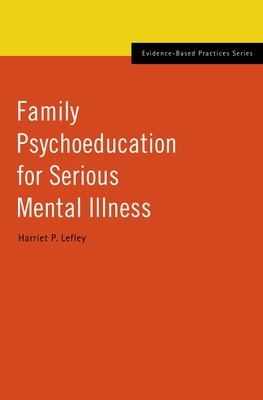
- Išsiųsime per 10–14 d.d.
- Autorius: Harriet P Lefley
- Leidėjas: Oxford University Press, USA
- ISBN-10: 0195340493
- ISBN-13: 9780195340495
- Formatas: 15.8 x 23.6 x 2 cm, kieti viršeliai
- Kalba: Anglų
- Extra -15 % nuolaida šiai knygai su kodu: ENG15
Family Psychoeducation for Serious Mental Illness (el. knyga) (skaityta knyga) | knygos.lt
Atsiliepimai
Aprašymas
Research shows that many adults with serious mental illness live with or maintain contact with their families. But families are rarely given information about their relative's illness and their own needs for support are ignored. To be optimally beneficial, family members and other caregivers need education about the disorder, some knowledge of illness management techniques, and personal support. Family psychoeducation (FPE) is a powerful evidence-based psychosocial intervention that serves consumers and their families.
FPE has proven efficacious in reducing relapse and hospitalization, reducing symptoms, increasing employability of persons with severe and persistent mental illness, and, in many cases, enhancing their families' well-being. Its success rests with a state-of-the-art education model for improving caregivers' understanding of their loved one's illness through learning what is known and not known about it and how to assess and cope with its manifestations. Here, in the first book of its kind, Harriet P. Lefley traces the history of FPE -- including the developments in mental health services and systems and theoretical approaches that inform it -- and the robust empirical evidence it now claims after a quarter-century of development and evaluation at major research centers around the world. Presenting first the approach's generic components, training models, and required competencies, Lefley then discusses the available variations, such as Family Education (FE), a brief manualized form ofFPE offered by professionally trained family members that has some empirical support for knowledge gains and easing family distress. The result is a comprehensive, practical introduction to family psychoeducation that critically appraises the evidence and examines the model's place in contemporary mental health systems. This groundbreaking volume is an ideal training tool for graduate students of social work, psychology, and psychiatry and a valuable addition to the clinician's armamentarium of evidence-based practices for clients with serious mental illness.
EXTRA 15 % nuolaida su kodu: ENG15
Akcija baigiasi už 5d.10:58:28
Nuolaidos kodas galioja perkant nuo 10 €. Nuolaidos nesumuojamos.

- Autorius: Harriet P Lefley
- Leidėjas: Oxford University Press, USA
- ISBN-10: 0195340493
- ISBN-13: 9780195340495
- Formatas: 15.8 x 23.6 x 2 cm, kieti viršeliai
- Kalba: Anglų Anglų
Research shows that many adults with serious mental illness live with or maintain contact with their families. But families are rarely given information about their relative's illness and their own needs for support are ignored. To be optimally beneficial, family members and other caregivers need education about the disorder, some knowledge of illness management techniques, and personal support. Family psychoeducation (FPE) is a powerful evidence-based psychosocial intervention that serves consumers and their families.
FPE has proven efficacious in reducing relapse and hospitalization, reducing symptoms, increasing employability of persons with severe and persistent mental illness, and, in many cases, enhancing their families' well-being. Its success rests with a state-of-the-art education model for improving caregivers' understanding of their loved one's illness through learning what is known and not known about it and how to assess and cope with its manifestations. Here, in the first book of its kind, Harriet P. Lefley traces the history of FPE -- including the developments in mental health services and systems and theoretical approaches that inform it -- and the robust empirical evidence it now claims after a quarter-century of development and evaluation at major research centers around the world. Presenting first the approach's generic components, training models, and required competencies, Lefley then discusses the available variations, such as Family Education (FE), a brief manualized form ofFPE offered by professionally trained family members that has some empirical support for knowledge gains and easing family distress. The result is a comprehensive, practical introduction to family psychoeducation that critically appraises the evidence and examines the model's place in contemporary mental health systems. This groundbreaking volume is an ideal training tool for graduate students of social work, psychology, and psychiatry and a valuable addition to the clinician's armamentarium of evidence-based practices for clients with serious mental illness.



Atsiliepimai